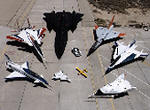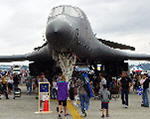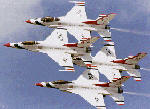
|
Description
| Manufacturer: | Hughes | |
| Base model: | F-11 | |
| Designation: | XF-11 | |
| Designation System: | U.S. Air Force | |
| Designation Period: | 1930-1947 | |
| Basic role: | Photographic | |
| Status: | Experimental | |
Specifications
| Not Yet Available |
Recent comments by our visitors
| matt , MI | Dose anyone know if the schematics for the XF-11 are still around?
If so, dose anyone know where they can be found? 07/28/2010 @ 17:24 [ref: 28425] |
| Jon , TX | [quote]He landed his amphibian in Lake Mead NV with the landing gear down[/quote]
Just to clear this up,I agree that Hughes was considered a somewhat reckless pilot, but this was not the cause of his crash on lake Meade. He did not land with his landing gear down, but instead failed to notice that the ballasts were improperly loaded, causing the Sikorsky to pitch forward on landing. 07/14/2009 @ 13:49 [ref: 24296] |
| Jon Houston, TX | It went to an AFB in Texas where it was briefly used but only for taxi training exercises. After sitting on the tarmac for a few years it was recycled for scrap. 07/14/2009 @ 13:37 [ref: 24295] |
| Dave Klinzing Hamilton, OH | I'm afraid I already know the answer, but what ever happened to the second prototype? 05/24/2009 @ 18:10 [ref: 24198] |
| R. Dell Kingman, AZ | Howard was notorious for not following procedures or check lists. He landed his amphibian in Lake Mead NV with the landing gear down. He took the XF-11 up for some specific tests and then went off and did his own thing with it and it crashed. 03/28/2009 @ 18:05 [ref: 24037] |
| Jon , TX | Oh by the way, here's Howard's defense of why he didn't shut off the engine. "Because the theory, that I should have known that this dissymmetry in the airplane's flight tendencies and attitude was caused by the propeller, and not by some other structural failure. That theory is a very, very thin one, because with a dual rotation propeller and only half of the propeller in reverse - not all of it - it was very obvious that all instruments indicated the power plant and the propeller to be functioning normally. And I just don't think that a more thorough scrutiny of this matter would lead anyone to the conclusion that the pilot had any rhyme or reason or opportunity to believe that the trouble was caused by the propeller." 02/10/2009 @ 14:08 [ref: 23687] |
| Jon , TX | Ah, thanks for the info. Why do you think a skilled pilot like Howard Hughes wouldn't shut off the engine? Was it just poor judgment caused by fear, or did he think something else was causing the problem? 02/10/2009 @ 13:59 [ref: 23685] |
| Jack L Gilbert Rio Rancho, NM | RE: Mr. Prinz's comments about the crash. Mr. Prinz is correct in his accessment. If a large, multi-bladed propellor is being turned by an engine at flat pitch, even at idle, it will produce a great amount of continuous drag. However, if the engine is shut down, the propellor will produce much less drag. It will still affect the aircraft's performance, but, it will not be as dramatic or detrimental as it would be if the engine is running. Hughes blew it. 02/09/2009 @ 08:53 [ref: 23676] |
| Eric Waco, TX | I made a mistake I'm not from utah I clicked the wrong thing 01/06/2009 @ 13:30 [ref: 23427] |
| Eric R. Waco, UT | Hello, I'm making a web site on howard hughes and iwant to know more on this crash 01/06/2009 @ 13:14 [ref: 23426] |
Recent photos uploaded by our visitors





